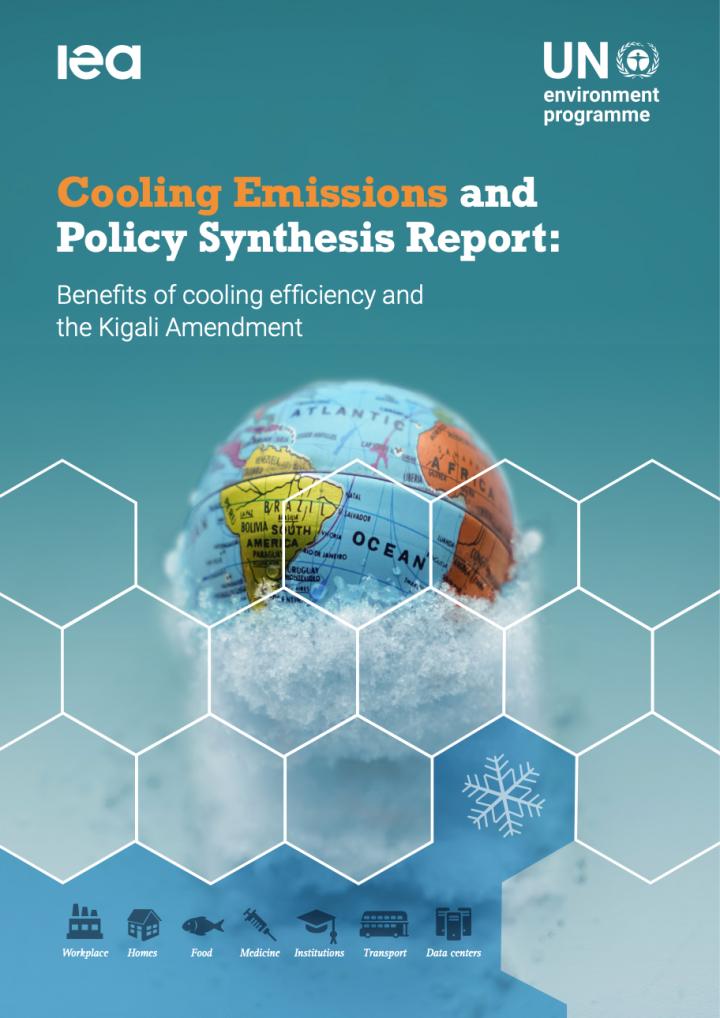As need for cooling rises in step with world temperatures, energy-efficient, climate-friendly appliances are critical to reaching Paris Agreement goals; 3.6 billion appliances in use now, 14 billion will be required by 2050 to meet all needs

Credit: UNEP / IEA
Coordinated international action on energy-efficient, climate-friendly cooling could avoid as much as 460 billion tonnes of greenhouse gas emissions – roughly equal to eight years of global emissions at 2018 levels – over the next four decades, according to the Cooling Emissions and Policy Synthesis Report from the United Nations Environment Programme (UNEP) and the International Energy Agency (IEA).
Reductions of between 210 and 460 billion tonnes of carbon dioxide-(CO2) equivalent emissions can be delivered over the next four decades through actions to improve the cooling industry’s energy efficiency together with the transition to climate-friendly refrigerants, according to the report.
The report says countries can institutionalize many of these actions by integrating them into their implementation of the Kigali Amendment to the Montreal Protocol. Signatories to the Kigali Amendment have agreed to reduce the production and use of climate-warming refrigerant gases known as hydrofluorocarbons (HFCs), which has the potential to avoid as much as 0.4°C of global warming by 2100 through this step alone.
Nations must deliver massive cuts in their greenhouse gas emissions to get on track to limit global temperature rise this century to 1.5°C. This is critical to minimizing the disastrous impacts of climate change. As nations invest in COVID-19 recovery, they have an opportunity to use their resources wisely to reduce climate change, protect nature and reduce risks of further pandemics. Efficient, climate-friendly cooling can help to achieve all of these goals,” said Inger Andersen, UNEP Executive Director.
The report highlights the importance of cooling to maintaining healthy communities; fresh vaccines and food; a stable energy supply, and productive economies. The essential nature of cooling services is underlined by the COVID-19 pandemic, as temperature-sensitive vaccines will require quick deployment around the globe; lockdowns forcing people to stay at home for long periods of time are a health concern in many hot countries.
However, increasing demand for cooling is contributing significantly to climate change. This is the result of the emissions of HFCs, CO2, and black carbon from the mostly fossil fuel-based energy that powers air conditioners and other cooling equipment.
“As governments roll out massive economic stimulus packages to deal with the economic and social impacts of the COVID-19 crisis, they have a unique opportunity to accelerate progress in efficient, climate-friendly cooling.Higher efficiency standards are one of the most effective tools governments have to meet energy and environmental objectives. By improving cooling efficiency, they can reduce the need for new power plants, cut emissions and save consumers money. This new report gives policy makers valuable insights to help them address the global cooling challenge” said Dr Fatih Birol, IEA Executive Director.
Worldwide, an estimated 3.6 billion cooling appliances are in use. The report says that if cooling is provided to everybody who needs it – and not just those who can afford it – this would require as many as 14 billion cooling appliances by 2050.
The IEA estimates that doubling the energy efficiency of air conditioning by 2050 would reduce the need for 1,300 gigawatts of additional electricity generation capacity to meet peak demand – the equivalent of all the coal-fired power generation capacity in China and India in 2018. Worldwide, doubling the energy efficiency of air conditioners could save up to USD 2.9 trillion by 2050 in reduced electricity generation, transmission and distribution costs alone.
Action on energy efficiency would bring many other benefits, such as increased access to life-saving cooling, improved air quality and reduced food loss and waste, the report says.
The report lays out the available policy options available that can make cooling part of climate and sustainable development solutions, including:
- International cooperation through universal ratification and implementation of the Kigali Amendment and initiatives such as the Cool Coalition and the Biarritz Pledge for Fast Action on Efficient Cooling
- National Cooling Action Plans that accelerate the transition to climate friendly cooling, and identify opportunities to incorporate efficient cooling into stronger Nationally Determined Contributions under the Paris Agreement
- Development and implementation of Minimum Energy Performance Standards and energy efficiency labelling to improve equipment efficiency
- Promotion of building codes and other considerations to reduce demand for refrigerant and mechanical cooling, including integration of district and community cooling into urban planning, improved building design, green roofs, and tree shading
- Campaigns to stop environmentally harmful product dumping to transform markets and avoid the burden of obsolete and inefficient cooling technologies
- Sustainable cold-chains to both reduce food loss – a major contributor to greenhouse gas emissions – and reduce emissions from cold chains
The 48-page peer-reviewed report was authored by a range of experts under the guidance of a 15-member steering committee co-chaired by Nobel laureate Mario Molina, President, Centro Mario Molina, Mexico, and Durwood Zaelke, President, Institute for Governance & Sustainable Development, USA. The report is supported by the Kigali Cooling Efficiency Programme (K-CEP).
###
About the UN Environment Programme
The UN Environment Programme (UNEP) is the leading global voice on the environment. It provides leadership and encourages partnership in caring for the environment by inspiring, informing and enabling nations and peoples to improve their quality of life without compromising that of future generations.
About the International Energy Agency
The International Energy Agency (IEA) works with governments and industry to shape a secure and sustainable energy future for all.
Media Contact
Terry Collins, 416-878-8712,
[email protected]




